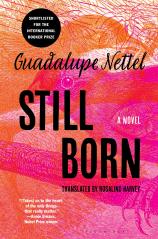Still Born
Review
Still Born
Near the beginning of Guadalupe Nettel’s STILL BORN, Laura writes that she and her twenty-something friends could be divided into two camps: those who imagined one day having children and those who, like Laura and her friend Alina, “were prepared to accept the disgrace heaped on them by society and family as long as they could preserve their autonomy.” But as Laura and Alina enter their mid-30s, their paths begin to diverge. Laura, an academic in the midst of her thesis research, remains devoted to her independence and singleness. Alina, on the other hand, succumbs to the appeal of parenthood, even going so far as to pursue fertility treatments with her partner, Aurelio.
"STILL BORN raises provocative questions about the ability of women to shape their own destinies while finding fulfillment in helping to shape the lives of others."
When Alina finally conceives, Laura is happy for her, even as she acknowledges that their lives now look increasingly dissimilar. When, midway through her pregnancy, Alina and Aurelio receive devastating news about their fetus, the two women grow even farther apart. Their unborn daughter, whom they name Inés, is diagnosed with lissencephaly, meaning that she lacks all but the most rudimentary brain structure and, according to the doctors, is likely to die immediately after birth. Over the last weeks and months of Alina’s pregnancy, she undergoes a grief process, coming to terms with what everyone seems to agree is the inevitable loss of the child she so badly wanted. But when Inés is born, Alina and Aurelio have more surprises --- and more desperately hard work --- in store.
Meanwhile, Laura is embarking on her own unexpected journey, as she is drawn into the lives of her next-door neighbor, a recently widowed woman and her young son. Nicolás acts out, verbally and physically, seeming to replicate the abusive behaviors of his deceased father. His mother responds by retreating into depression, leaving Nicolás more and more isolated and confused. Reluctantly, Laura begins spending time with the boy, eventually developing her own quasi-maternal relationship with him, much to her own surprise.
Nettel’s chronicle of several pivotal months in these women’s lives utilizes interesting narrative techniques. At first, the book is solely from Laura’s point of view, but once Inés enters the world, whole chapters center on Alina’s experiences, which are narrated in third person but reveal intimate truths and emotions that would not be available to Laura. It’s as if the novel is acknowledging the ways in which becoming a parent sets women off on different trajectories, separating them from the lives and, to a certain extent, the friends they had before. This is especially true in the case of Alina, who faces an ethical dilemma the likes of which few people have to contend with.
Both Alina’s and Laura’s stories reinforce the extent to which motherhood reshapes a woman’s life, for better or for worse. Alina and Aurelio’s saga with Inés is truly harrowing but oddly optimistic, and Laura’s account of being surprised by the joys of caring for a child, even one who is not biologically related to her and came into her life not by choice, is quietly moving. STILL BORN raises provocative questions about the ability of women to shape their own destinies while finding fulfillment in helping to shape the lives of others.
Reviewed by Norah Piehl on August 18, 2023
Still Born
- Publication Date: August 8, 2023
- Genres: Fiction, Women's Fiction
- Hardcover: 224 pages
- Publisher: Bloomsbury Publishing
- ISBN-10: 1639730036
- ISBN-13: 9781639730032



